In conversation with Dr Brendan McCormick Kilbride – Presidential Fellow
Meet the Department 5th August 2019
I spoke with Presidential Fellow Dr Brendan McCormick Kilbride about his work – from the role of volcanic gas emissions in detecting the onset of eruptions, to mass spectrometry at Manchester, and monitoring and hazard response in Papua New Guinea.
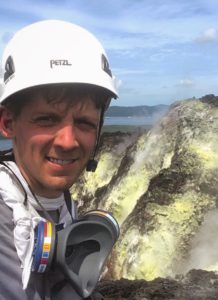
How would you describe your research for the layman?
I’m a volcanologist, particularly interested in volcanic gas emissions. Understanding gas is critical for volcanology: the ability of gas to escape from rising magmas controls the violence of eruptions and we can monitor changes in gas chemistry and flux to potentially detect the onset of eruptions before they occur. Volcanic gases are also important on the geological timescale – the ocean-atmosphere system that make the Earth habitable for humans and all other life is possible because of volcanic outgassing over hundreds of millions of years. My research methods include satellite observations, direct measurements on active volcanoes in the field and laboratory analyses of gas and rocks. My main field area right now is in Papua New Guinea.
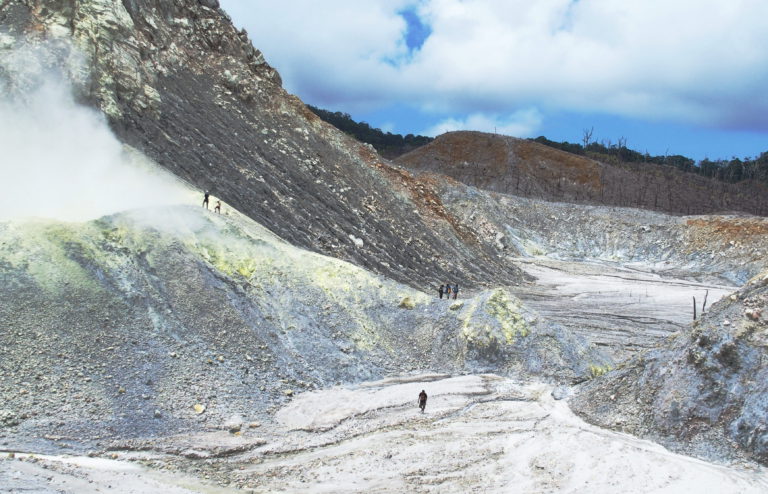
How did you first get interested in your research area?
I studied earth sciences as an undergraduate, and in the fourth year I had to do a research project. I had been really enjoying the volcanology modules and was further enthused in the topic after talking with the volcanologists on the faculty. The project I undertook was an investigation into the emission and potential environmental impact of toxic mercury from Vulcano Island, Italy. This project gave me some fieldwork experience, introduced me to analytical methods in lab, and was the first time I’d really had to gather my own data and interpret it, to come up with an understanding of emissions from a volcano. Following this project I began to apply for PhDs and it was natural to look out for exciting opportunities with volcanologist supervisors.
How does your work benefit the public?
One of the main goals of volcanology is to be able to better forecast volcanic eruptions. We’ve seen a lot of examples of sudden and dangerous increases in activity in the last couple of months, from the paroxysmal event on Stromboli (Italy) to the first major explosive eruption of Ulawun (Papua New Guinea) in over twenty years. A lot of our work is ultimately very practical : by developing new understanding of volcanic processes we can monitor volcanoes more effectively and share critical and timely data with the authorities working to keep the public safe.
How will working in Manchester benefit your research?
In many ways, the Department here in Manchester is ideal for my current research. One of the big draws is the instrumentation in the isotope geochemistry labs, specifically the Argus and Helix mass spectrometers. Noble gas isotopes are very powerful tools for probing the origins of volcanic gases, working out which reservoirs in the deep earth these volatiles were sourced from. I’m excited about gaining expertise in new analytical techniques and working closely with the volcanology and geochemistry research groups.
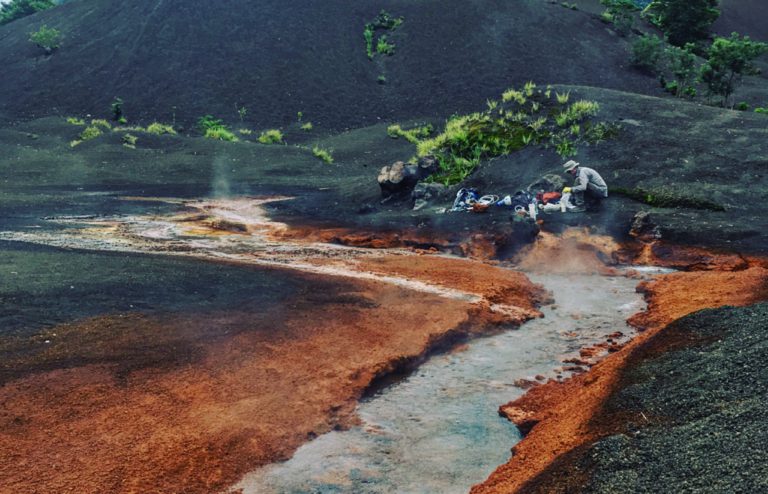
Who or what first inspired your interest in science and engineering?
As it happens, both of my parents are geologists and I think I was definitely raised to look around me at the natural world in a certain way, trying to read the landscape and thinking about how it might have changed over vast expanses of time. What really pushed me into science though was a trip during high school to NASA’s Johnson Space Center in Houston. I grew up in rural Aberdeenshire and was selected to enter a Scotland-wide competition for state school students who showed aptitude for science. You had to complete some research projects to get selected, and I really enjoyed doing that, learning about the earth, the moon and space. In a sense it was the first time I’d done a research project and completing that project and winning a place on the school then led to the most amazing interactions with real scientists, astronauts, flight controllers, robot specialists; a visit to the historic mission control; and meeting a bunch of other young and inspiring folks from across Scotland. Even though planetary science was not the area I’ve ended up working in I think this was an important, formative experience.
Describe your role in the School.
I’m a Presidential Fellow, appointed in a Faculty-wide competition for a four-year research-led fellowship. This is a great opportunity as it allows me a significant period of time to devote to consolidating an independent research profile and acquiring my own research funding. The fellowships are on one hand quite structured, with mentorship and training in both pedagogy and research leadership, but also a big opportunity to have a lot of freedom in directing my own research activities. In the first couple of years I will be mostly research focussed but hope to join one or two of the undergraduate field courses next spring.
What are you proudest of in your career to date?
In the last couple of years I’ve been working in Papua New Guinea, a nation that is home to many active volcanoes, but which has only limited infrastructure for monitoring volcanoes and responding to hazards. They have very dedicated scientists and civil defence people on the ground but they are very stretched in terms of their resources. Over the last 2-3 years we’ve managed to attract quite a lot of funding and international partnerships into working on volcanoes in PNG – we have been providing data, providing training in different instruments, made use of drones, and supplied volcanic gas sensing equipment so that our colleagues in-country are really benefiting from this research. I think we are making a big difference to their work on the ground in terms of monitoring volcanoes and responding to hazards, and that’s been really affirming work to do because you can actually see a real impact.
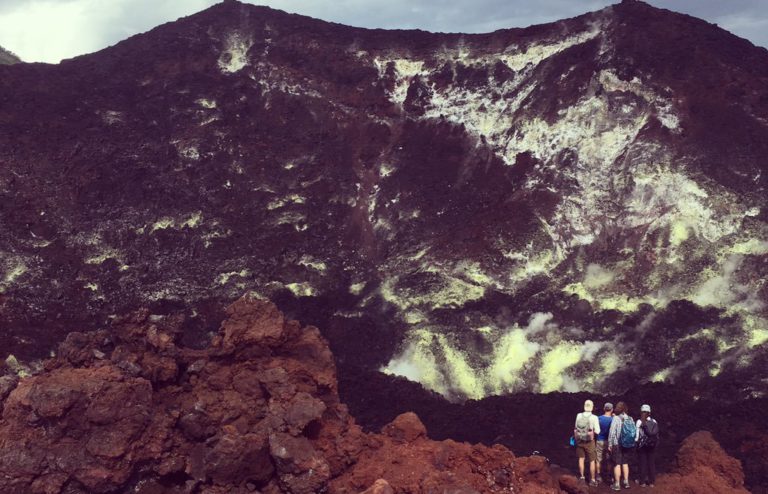
What are your hobbies or interests outside of work?
I play and watch a lot of football (and I’m still looking for a regular 5-aside game here in Manchester…). My wife, Laura, and I have an allotment that we spend a lot of time working on and cooking from. Otherwise, we have a one year son, Gus, who is consistently entertaining and extremely lively.
What advice would you give to your younger self?
Advice has to be carefully given, I think, but my main recommendation would be trying to remember that your research should be enjoyable. Naturally there will be difficult periods, but overall it has to be something that you enjoy doing. If you find you’re not enjoying it, you should definitely pause and reflect and work out what is wrong and fix that before you go any further. There’s a lot of academic grandstanding about the criteria to become a world class researcher – forget weekends, spend 60 hours a week on your PhD – I think it’s nonsense, I don’t believe it’s true. One or two major deadlines aside, I didn’t work evenings and weekends as a PhD student or during my postdoc and I believe that maintaining some time away from your rocks or writing or lab is essential – nobody ever did their best work by punishing themselves or running themselves ragged.
Interview conducted by Jemma Stewart.
Follow on Manchester Volcanology on Twitter @ManchesterVolc.
hazard responsemass spectrometrynoble gas isotopesvolcanic processesVolcanology

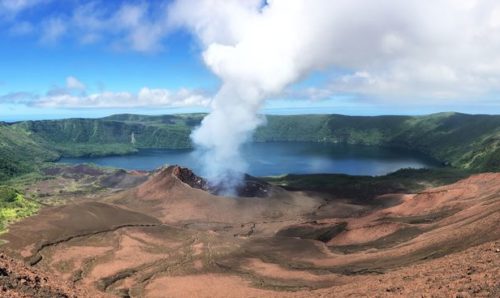
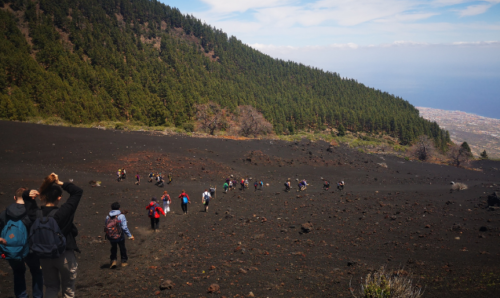
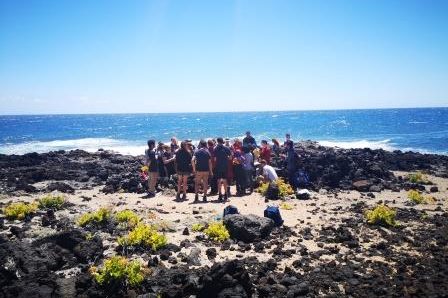
Leave a Reply